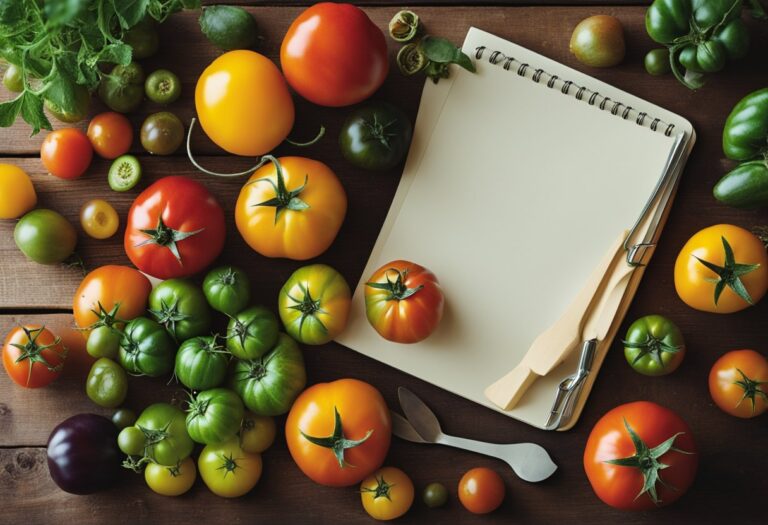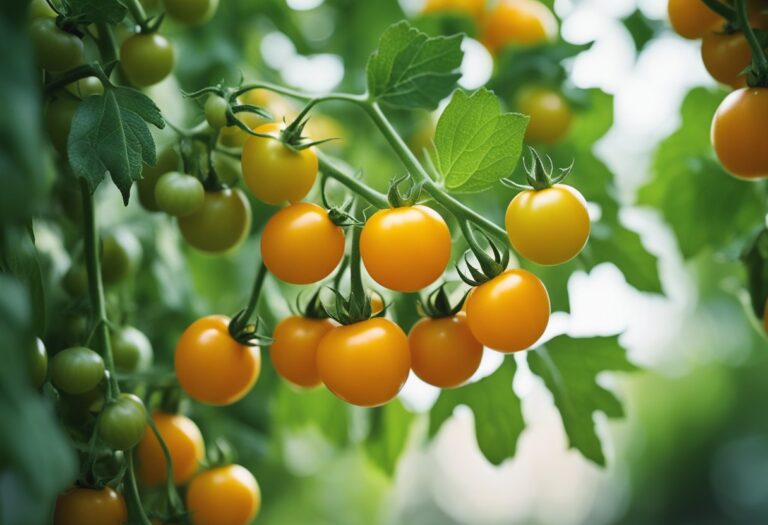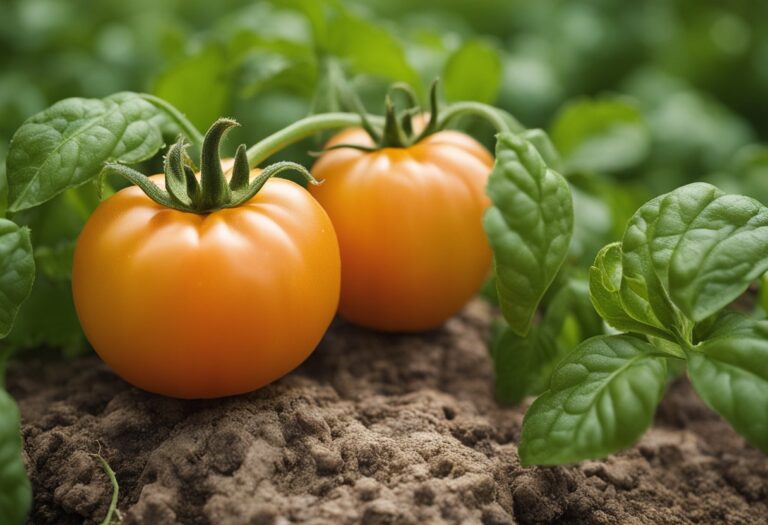Does Tomatoes Like Coffee Grounds? A Gardener’s Guide to Using Coffee Grounds on Tomato Plants
If you’re a gardener, you’re probably always looking for ways to improve the health and yield of your plants. One popular method is to use coffee grounds as a fertilizer. But what about tomatoes? Do they like coffee grounds? The answer is not as straightforward as you might think.

Coffee grounds can be a great addition to your garden, but it’s important to understand the basics of using them as a fertilizer. Coffee grounds are high in nitrogen, which is an essential nutrient for plant growth. They also contain other beneficial minerals like calcium, magnesium, and potassium. However, they are not a complete fertilizer, meaning they do not provide all of the nutrients that plants need to thrive.
When it comes to tomatoes, they have specific nutritional needs that must be met for optimal growth and yield. While coffee grounds can provide some of the necessary nutrients, they should not be used as the sole fertilizer for tomato plants. Additionally, using too many coffee grounds can affect the soil’s pH, which can negatively impact the plants. So, while coffee grounds can be a helpful addition to your tomato garden, it’s important to use them in moderation and in combination with other fertilizers.
Key Takeaways
- Coffee grounds can be a helpful addition to your tomato garden, but they should not be the sole fertilizer.
- Tomatoes have specific nutritional needs that must be met for optimal growth and yield.
- Using too many coffee grounds can negatively impact the soil’s pH and the health of the plants.
The Basics of Coffee Grounds as Fertilizer

If you’re looking for a natural and affordable way to fertilize your tomato plants, coffee grounds may be the answer. Coffee grounds are a great source of nitrogen, phosphorus, and potassium, which are essential nutrients for plant growth. In addition, coffee grounds can improve soil structure, increase water retention, and attract beneficial organisms like earthworms.
When using coffee grounds as fertilizer, it’s important to keep a few things in mind. First, coffee grounds are acidic, which means they can lower the pH of your soil. While this can be beneficial for acid-loving plants like tomatoes, it’s important not to overdo it. Too much acidity can harm your plants and cause nutrient deficiencies.
To avoid over-acidification, it’s recommended to mix coffee grounds with other organic materials like compost or leaf mold before applying them to your soil. A good ratio is one part coffee grounds to two parts organic matter. You can also sprinkle a thin layer of coffee grounds around the base of your tomato plants and cover them with a layer of organic mulch like grass clippings or leaves.
It’s also important to note that coffee grounds can take some time to break down and release their nutrients. This means that they are best used as a long-term fertilizer rather than a quick fix. You can sprinkle coffee grounds on your soil once or twice a year to provide a steady source of nutrients for your tomato plants.
In summary, coffee grounds can be a great natural fertilizer for your tomato plants. Just be sure to mix them with other organic materials, avoid over-acidification, and use them as a long-term fertilizer rather than a quick fix. With a little bit of patience and care, your tomato plants will thank you for the nutrient boost!
Tomatoes’ Nutritional Needs

Tomatoes are a popular vegetable that can be enjoyed in many different ways. Whether you prefer them fresh, cooked, or canned, tomatoes are a nutritious addition to any diet. In order to grow healthy and produce a bountiful harvest, tomatoes require certain nutrients.
One of the most important nutrients for tomatoes is nitrogen. Nitrogen is essential for plant growth and helps to produce healthy foliage. Tomatoes also need phosphorus, which is important for root development and flower production. Potassium is another key nutrient for tomatoes, as it helps to regulate water balance and improve fruit quality.
In addition to these macronutrients, tomatoes also require micronutrients such as calcium, magnesium, and iron. These nutrients are essential for plant growth and development, and deficiencies can lead to stunted growth and poor fruit production.
To ensure that your tomatoes are getting all of the nutrients they need, it is important to use a balanced fertilizer. You can also amend your soil with organic matter such as compost or aged manure to provide additional nutrients.
While coffee grounds can be a good source of nitrogen for some plants, including tomatoes, it is important to use them in moderation. Excessive use of coffee grounds can lead to an imbalance of nutrients and may even harm your plants. Instead, consider using coffee grounds as part of a compost mixture or as a top dressing around your tomato plants.
By providing your tomatoes with the proper nutrients, you can ensure that they will grow healthy and produce a bountiful harvest.
Benefits of Coffee Grounds for Tomato Plants
If you’re wondering whether tomatoes like coffee grounds, the answer is yes! Coffee grounds are a great addition to your tomato plants as they provide several benefits. In this section, we’ll explore two of the main benefits of coffee grounds for tomato plants: acidifying soil and natural pest deterrent.
Acidifying Soil for Tomatoes
Tomatoes prefer slightly acidic soil with a pH between 6.0 and 6.8. Coffee grounds are slightly acidic, with a pH of around 6.2, making them a great addition to your tomato plants. Adding coffee grounds to your soil can help to lower the pH and create a more acidic environment for your tomato plants to thrive in.
However, it’s important not to overdo it with the coffee grounds. Too much can make the soil too acidic, which can lead to nutrient deficiencies and other problems. A 1/2 inch layer of fresh coffee grounds around tomato plants is all you need to provide the benefits without overdoing it.
Natural Pest Deterrent
Coffee grounds also act as a natural pest deterrent. They contain caffeine and other compounds that repel pests like slugs, snails, and ants. Adding coffee grounds to your soil or using them as mulch around your tomato plants can help to keep these pests at bay.
In addition to repelling pests, coffee grounds can also attract earthworms to your soil. Earthworms are beneficial to your tomato plants as they help to aerate the soil and break down organic matter, making nutrients more available to your plants.
In summary, coffee grounds are a great addition to your tomato plants as they can help to acidify the soil and act as a natural pest deterrent. Just be sure to use them in moderation to avoid overdoing it.
How to Apply Coffee Grounds to Tomato Plants
If you’re interested in using coffee grounds on your tomato plants, there are two main ways to do so: direct application and composting. Both methods have their own benefits, so it’s up to you to decide which one works best for your garden.
Direct Application
Direct application is the simplest way to use coffee grounds on your tomato plants. All you need to do is spread a thin layer of fresh coffee grounds around the base of your tomato plants. This layer should be no more than 1/2 inch thick, as too much coffee grounds can lead to nitrogen burn.
Coffee grounds can help retain moisture in the soil, and the natural chemicals found in coffee grounds may help prevent fungal diseases. However, it’s important to note that coffee grounds are pH neutral, so they won’t acidify your soil as some people believe.
Composting with Coffee Grounds
Composting with coffee grounds is another way to use them on your tomato plants. When mixed with leaves or sawdust, compost made with coffee grounds can provide essential nutrients for tomatoes while combating fungal diseases. You can incorporate compost into the soil or use it as mulch around tomato plants.
To make compost with coffee grounds, mix them with other organic materials such as leaves, grass clippings, and vegetable scraps. Make sure to balance the carbon-to-nitrogen ratio in your compost pile, as too much nitrogen can lead to a smelly, slimy pile.
In conclusion, using coffee grounds on your tomato plants can be a great way to provide them with extra nutrients and help prevent fungal diseases. Whether you choose to apply them directly or compost them, make sure to use them in moderation and balance them with other organic materials.
Potential Drawbacks of Using Coffee Grounds
If you’re considering using coffee grounds as a fertilizer for your tomato plants, it’s important to be aware of the potential drawbacks. While coffee grounds can provide some benefits, they can also have some negative effects on your plants if not used properly.
Over-Acidification Risks
One of the most common myths about using coffee grounds on tomato plants is that they can acidify the soil. However, this is not entirely true. While coffee grounds are slightly acidic, they are not acidic enough to cause harm to your plants. In fact, coffee grounds are pH neutral, so they won’t change the pH of your soil significantly.
However, if you use too many coffee grounds, you could potentially over-acidify your soil. This can lead to nutrient deficiencies and other problems, which can negatively impact the growth and health of your tomato plants. To avoid this, it’s important to use coffee grounds in moderation and to mix them well with other organic materials.
Caffeine Content Considerations
Another potential drawback of using coffee grounds on tomato plants is the caffeine content. While caffeine is not harmful to plants in small amounts, it can be toxic in large quantities. If you use too many coffee grounds, you could potentially expose your tomato plants to high levels of caffeine, which can stunt their growth and cause other problems.
To avoid this, it’s important to use coffee grounds in moderation and to mix them well with other organic materials. You should also avoid using coffee grounds that have been brewed with chemicals or other additives, as these can be harmful to your plants.
Overall, while coffee grounds can provide some benefits to your tomato plants, it’s important to be aware of the potential drawbacks. By using coffee grounds in moderation and mixing them well with other organic materials, you can help ensure that your tomato plants thrive and grow healthy.
Alternative Organic Fertilizers for Tomatoes
While coffee grounds can be a great organic fertilizer for tomatoes, there are other options available if you don’t have access to coffee grounds or if you want to mix up your fertilizing routine.
Compost
Composting is a great way to create your own organic fertilizer. By composting food scraps, yard waste, and other organic materials, you can create a nutrient-rich soil amendment that can be used to fertilize your tomato plants. Compost is rich in nitrogen, phosphorus, and potassium, which are all essential nutrients for plant growth. You can add compost to your garden beds or mix it into potting soil for container-grown tomatoes.
Fish Emulsion
Fish emulsion is a liquid fertilizer made from fish waste. It’s high in nitrogen, which makes it a great fertilizer for tomatoes during the vegetative growth stage. Fish emulsion is also rich in trace minerals, which can help improve soil health. You can find fish emulsion at most garden centers or online.
Bone Meal
Bone meal is a slow-release fertilizer made from ground-up animal bones. It’s high in phosphorus, which is important for root development and flower production. Bone meal is also a good source of calcium, which can help prevent blossom end rot in tomatoes. You can add bone meal to your garden beds or mix it into potting soil for container-grown tomatoes.
Worm Castings
Worm castings are a nutrient-rich soil amendment made from worm waste. They’re high in nitrogen, phosphorus, and potassium, as well as beneficial microorganisms that can help improve soil health. Worm castings can be added to your garden beds or mixed into potting soil for container-grown tomatoes. You can purchase worm castings online or at most garden centers.
Conclusion
In conclusion, there are several alternative organic fertilizers for tomatoes that can be used in place of coffee grounds. Compost, fish emulsion, bone meal, and worm castings are all great options that can help provide your tomato plants with the nutrients they need to thrive.
Frequently Asked Questions
How can coffee grounds be used to benefit tomato plants?
Coffee grounds can provide a nutrient boost to your tomato plants. They are rich in nitrogen, which is a vital nutrient for plant growth. Incorporating coffee grounds into the soil can help maintain an optimal pH level, ensuring that the tomato plants can efficiently absorb nutrients from the soil. Additionally, coffee grounds can slowly decompose, improving your soil quality and adding nutrients.
What are the best ways to apply coffee grounds to tomato plants?
There are several ways to apply coffee grounds to your tomato plants. One way is to mix coffee grounds into the soil before planting your tomatoes. Another way is to use coffee grounds as a mulch around your tomato plants. You can also add coffee grounds to your compost pile and use the resulting compost as a fertilizer for your tomato plants.
Are there any risks associated with using coffee grounds for tomato plants?
While coffee grounds can provide benefits to your tomato plants, there are some risks to be aware of. Coffee grounds are acidic when fresh, so using too many can affect the soil’s pH. Tomatoes thrive in a slightly acidic environment, typically within a pH range of 6.0 to 6.8. It is important to use coffee grounds in moderation and monitor your soil’s pH levels.
How do coffee grounds compare to eggshells as a fertilizer for tomatoes?
Eggshells and coffee grounds can both provide nutrients to your tomato plants. Eggshells are a good source of calcium, which can help prevent blossom end rot in tomatoes. Coffee grounds are rich in nitrogen, which is important for plant growth. It is recommended to use both eggshells and coffee grounds in moderation and to monitor your soil’s pH levels.
What other plants in the garden can benefit from the addition of coffee grounds?
Coffee grounds can benefit many plants in your garden, including blueberries, roses, and azaleas. These plants also prefer slightly acidic soil conditions and can benefit from the nutrient boost provided by coffee grounds.
What should you avoid when using coffee grounds in your tomato garden?
It is important to avoid using too many coffee grounds in your tomato garden, as this can affect the soil’s pH. Additionally, it is recommended to avoid using coffee grounds that have been treated with chemicals or additives, as these can be harmful to your plants. Finally, it is important to avoid using coffee grounds as the sole source of fertilizer for your tomato plants, as they do not contain all of the nutrients that tomatoes need to thrive.



